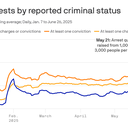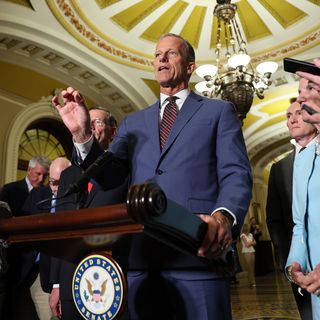How markets might react if Trump fires Powell
If President Trump fires Federal Reserve chair Jerome Powell, it would likely bring a period of short-term market volatility — along with higher long-term borrowing costs, as the Fed would be viewed as more subject to a president's whims.
The big picture: Trump appears to be itching to push out the Fed chief he originally appointed, perhaps by claiming that an over-budget building renovation constitutes legal cause.
- Paired with efforts to staff the Fed with more overtly political loyalists, that could remake what has been a bedrock of U.S. financial assets for decades — a central bank that is removed from the day-to-day political maw.
State of play: In the immediate aftermath of a Powell firing, there would be a period of deep uncertainty around who was in charge of the world's most powerful central bank.
- Would Powell be able to stay in his job while pursuing legal challenges? And how long would it take those legal challenges to be resolved one way or the other? Nobody really knows, because this hasn't happened before.
- Presumably vice-chair Philip Jefferson — not particularly well-known to financial markets — would temporarily lead the Board of Governors, while New York Fed president John Williams would lead the policy-setting Federal Open Market Committee. (By tradition the New York Fed chief is vice-chair of the committee.)
Zoom out: Short-term volatility is one thing. The bigger question strategists are weighing is how market might price in a new monetary regime under more direct White House control.
- A strong possibility is that a new Fed chair aligned with Trump's desires to cut short-term interest rates might end up delivering a much steeper yield curve — lower short-term rates paired with higher long-term rates.
By the numbers: The 30-year U.S. Treasury bond yielded 5.01% at yesterday's close, and prices of comparable inflation-protected securities imply that investors anticipate 2.35% annual inflation over that time horizon.
- If investors come to believe that any Fed chair who displeases the president will be fired, they could lose confidence inflation will hover at that low level, driving long-term bond rates up.
What they're saying: The long end of the Treasury yield curve "already has an elevated fiscal deficit and upside to consumer price pressures coming from tariffs to worry about," write Padhraic Garvey, Francesco Pesole and Chris Turner at ING in a note.
- "Adding front-end rates that are arguably too low for the economy risks adding permanence to the higher inflation prints," they add. "The outcome then is a much steeper curve, with front-end yields lower and longer-term yields higher."
- They argue that it would generate a flight away from the U.S. dollar and toward the euro, Japanese yen, and Swiss Franc.
The bottom line: If Trump follows through with his threats, expect a period of volatility, paired with cheaper short-term borrowing and higher long-term borrowing costs.





















